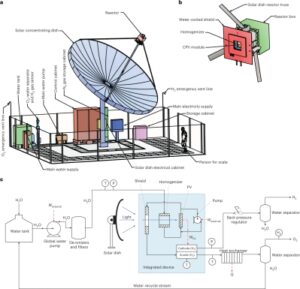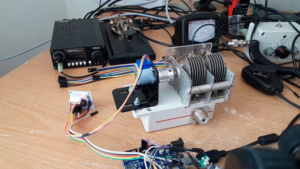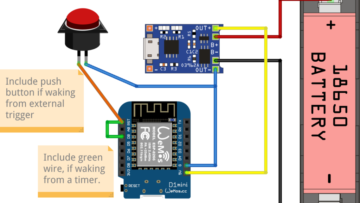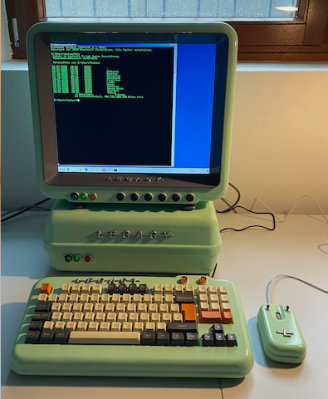Just a few hours ago, NASA dropped some devastating news: Ingenuity will fly no more. Three years after dropping from the belly of the Perseverance rover and after 72 flights through the thin Martian atmosphere, the little helicopter that could now can’t, after having sustained damage to one or more of its rotors during its final landing.

NASA’s terminal diagnosis of Ingenuity comes from a photo from one of the helicopter’s cameras, which shows a chunk missing from the tip of one of its rotors, likely caused by a rough landing after transiting a flat, sandy area that may have confused the aircraft’s navigational cameras.
While this is anything but good news, it’s not at all unexpected and in a way long overdue. Ingenuity was designed for a primary mission of just five flights, which it accomplished all the way back in May of 2021. There was heavy speculation at the time that Ingenuity might not even do that; we can recall one of the team members suggesting the odds were that Ingenuity’s tenure as the first controlled powered flying machine on another world would end as twisted wreckage in the newest, smallest crater on Mars.
But happily, Ingenuity proved the oddsmakers — and possibly those wishing to temper expectations — spectacularly wrong. In fact, by the fourth flight, it was clear that Ingenuity was in it for the long haul, enough so that NASA redefined its mission to “operational demonstration” and gave it another 30 sols of flight time. This gave the team the flight time needed to prove the helicopter’s worth as a scout for Perseverance and not just a distracting sideshow from the primary mission of searching for signs of ancient life on Mars.
Ingenuity‘s success was hard-fought; the plucky little unmanned aerial vehicle (UAV) had more than its share of close calls over the last three years. Designed to communicate to Earth mainly by relay through Perseverance, the helicopter lost contact with controllers on Earth quite a few times, with each blackout inducing a sense of “Is this finally it?” The helicopter had also been designed for only a few flights, all of which would occur during the relatively balmy Martian spring. This meant that controllers had to reprogram it to survive the harsh winter months when the computer would freeze solid and reset itself. They also had to figure out how to clean dust off the tiny solar panels, deal with imaging problems that scrambled the guidance computer, and probably most importantly, give the aircraft the ability to choose its own landing spots.
Sadly, it’s unlikely that we’ll see Ingenuity in its final landing zone anytime soon. Perseverance is currently about a kilometer away, too far to image the helicopter with the rover’s cameras. Although there’s no word yet if the rover will try to make the trip over, and doing so may not align with the rover’s primary mission, it seems to us that such a trip could be of immense value. From close up, Perseverance‘s MASTCAM would be able to provide data about the extent of damage and what caused it, which could be extremely valuable and might just inform the design of the space helicopters that are sure to follow in Ingenuity‘s footsteps.
But beyond the engineering data it would glean, getting the team back together for one last selfie would be an amazing tribute to both Ingenuity and the team that pushed its technology to the limit, and a bit beyond. Ingenuity pushed back so many engineering and scientific boundaries in its longer-than-expected but still far too brief life that it seems a little harsh to just leave it there sitting on the floor of Jezero Crater to die. A final visit so we can all pay our respects and celebrate the achievements of an incredible feat of human ingenuity seems like the least we can do.
[embedded content]
Photo credits: NASA/JPL-Caltech/ASU/MSSS
- SEO Powered Content & PR Distribution. Get Amplified Today.
- PlatoData.Network Vertical Generative Ai. Empower Yourself. Access Here.
- PlatoAiStream. Web3 Intelligence. Knowledge Amplified. Access Here.
- PlatoESG. Carbon, CleanTech, Energy, Environment, Solar, Waste Management. Access Here.
- PlatoHealth. Biotech and Clinical Trials Intelligence. Access Here.
- Source: https://hackaday.com/2024/01/25/so-long-and-thanks-for-all-the-flights-ingenuity-permanently-grounded-after-72-flights/
- :is
- :not
- $UP
- 1
- 2021
- 216
- 30
- 72
- a
- ability
- Able
- About
- accomplished
- achievements
- aerial vehicle
- After
- ago
- aircraft
- align
- All
- also
- Although
- amazing
- an
- Ancient
- and
- Another
- anything
- ARE
- AREA
- AS
- At
- Atmosphere
- away
- back
- BE
- been
- Beyond
- Bit
- BLADE
- both
- boundaries
- but
- by
- Calls
- cameras
- CAN
- caused
- celebrate
- Choose
- clean
- clear
- Close
- comes
- communicate
- computer
- confused
- contact
- content
- controlled
- could
- Credits
- Currently
- damage
- data
- deal
- Design
- designed
- devastating
- diagnosis
- Die
- do
- doing
- dropped
- Dropping
- during
- Dust
- each
- earth
- embedded
- end
- Engineering
- enough
- Ether (ETH)
- Even
- expectations
- extent
- extremely
- fact
- far
- feat
- few
- Figure
- final
- Finally
- First
- five
- flat
- flight
- Flights
- Floor
- flying
- follow
- For
- Fourth
- Freeze
- from
- gave
- getting
- Give
- good
- grounded
- guidance
- had
- Have
- having
- heavy
- helicopter
- helicopters
- HOURS
- How
- How To
- HTTPS
- human
- if
- image
- Imaging
- immense
- importantly
- in
- incredible
- inform
- ingenuity
- IT
- ITS
- itself
- jpg
- jpl
- just
- kilometer
- landing
- Last
- least
- Leave
- Life
- like
- likely
- LIMIT
- little
- Long
- lost
- machine
- mainly
- make
- many
- mars
- max-width
- May..
- meant
- Members
- might
- missing
- Mission
- months
- more
- most
- Nasa
- needed
- Newest
- news
- no
- now
- occur
- Odds
- of
- off
- on
- ONE
- only
- or
- our
- out
- over
- own
- panels
- Pay
- permanently
- photo
- plato
- Plato Data Intelligence
- PlatoData
- possibly
- powered
- primary
- probably
- problems
- Prove
- proved
- provide
- pushed
- quite
- redefined
- relatively
- Relay
- respects
- rover
- sandy
- says
- scientific
- Scout
- searching
- see
- seems
- sense
- Share
- showing
- Shows
- Signs
- Sitting
- So
- solar
- solar panels
- solid
- some
- Soon
- Space
- speculation
- spots
- spring
- Still
- success
- such
- sure
- survive
- sustained
- team
- Team members
- Technology
- Terminal
- than
- thanks
- that
- The
- There.
- they
- this
- those
- three
- Through
- time
- times
- tip
- to
- together
- too
- tribute
- trip
- try
- UAV
- Unexpected
- unlikely
- us
- Valuable
- value
- vehicle
- Visit
- was
- Way..
- we
- were
- What
- when
- which
- will
- Winter
- wishing
- with
- Word
- world
- worth
- would
- Wrong
- years
- yet
- youtube
- zephyrnet












